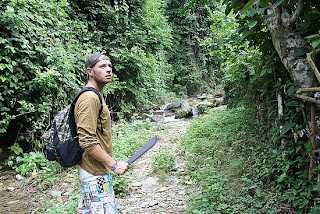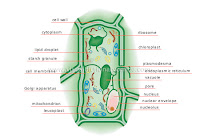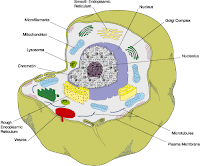 1. Skill - Creativity (Pictionary, Role play, Blog)
1. Skill - Creativity (Pictionary, Role play, Blog)- Autonomy (Own contribution)
- Critical thinking (own opinion)
- Student's Quiz
2. Quiz of Unit
3. Project - Blog
4. Classparticipation / Discipline
5. TE (on paper)
Student's Quiz
- Multiple Choice
- True / False
- Short answer
- Gap Filling
- Pictionary (see example)
November Quiz - December 2nd 2011
You are not alone :)
Warning: If you don't like to get scared don't watch this video.
Evaluation Criteria
After studying the unit of "Organisms" students should understand...
1. what we mean by levels of organisation and to list the different kinds of level
2. to correctly define what we mean by a cell, to analyse its composition, its structure and cellular activity.
3. how tissues, organs and systems of organs are formed where cellular differentiation is carried out
4. to list the differences between a plant and an animal cell.
5. to describe different kinds of plant and animal tissue, the role they and their location within the organism.
6. to use scientific methods in experiments
Grades: Class-Participation, Discipline, Attitude, Quiz, Blog, Experiment, Project, Creativity
The blog is seen as a reflection putting your own examples and discoveries. I recommend you to constantly update your activities in the blog. Remember the blog will be graded at the end of the month of November, 2011.
Project:
Create a glossary and then transform it into a pictionary. (Click here to see examples)
Experiment: See below !
Study Plan:
Week 1- 07.11.-11.11-2011 - Levels of organisation
Week 2- 14.11.-18.11-2011 - What is an organism made of ? What are the insides of cells like ?
Week 3- 21.11.-25.11-2011 - What do cells during their life span ? How do cells join together and how are they oganized ?
Week 4- 28.11.-02.12.-2011 - Quiz Preparation
__________________________________________________________________
Week 1- 07-11-2011 - What do we already know ?
- Levels of organisation
What do you already know ?
1. What are the three vital functions carried out by all living beings ?
2. What are the organs and systems responsible for these functions in a human being ?
Make a list.
Click here to find out about the function of nutrition.
Click here to find out about human reproduction.
Now investigate about the 4 interactional systems. (Homework for 11.02.2011, PPP using www.slideshare.net, bachelor2, bachelor2 or blog)
3. Put the following into order according to size: cell, atom, molecule, tissue
The words cloth, thread, and fiber can be used in the following sentence: Cloth consists of threads which are made of fiber. Use the words molecules, atoms, and cells to complete the following sentence:
Cells consist of..........................which are made of...........................
Is a tissue bigger than a cell ? What is a tissue ? Find out on page 43/44 or
click here to investigate on the Internet.
Watch this interesting video "From a molecule to a Galaxy"
Unit Overview Organisms:
1. Levels of organisation
2. What is an organism made of ?
3. What are the insides of cells like ?
4. What do cells during their life span ?
5. How do cells join together and how are they organised ?
---------------------------------------------------
---------------------------------------------------
1. Types of levels of organisation
Name the abiotic and ............components shown in the picture.
Click here to see a videoabout biotic and abiotic factors.

Identify the biotic levels of organisation and describe each feature. Give examples.
You may use your book page 45

Model:
Abiotic = Subatomic - an electron
= Atomic - An oxygen atom
= Molecular - Water
Biotic = ............................
________________________________________________________________________
Week 2- 14-18-2011 - What is an organism made of ? What are the insides of cells like ? (p.46-49)
2. What is an organism made of ?
1. Water and salts
Jelly fish contain 96 % of water.
Seeds contain only 20 % of water.
(Click here to find out)
2. What other elements can you find in the human body ? How about gold and silver ?
Click here to find out
 3. How do bones grow ?
3. How do bones grow ?Click here to find out.
4. What are the mineral salts in living being responsable for ?
5. What kind of minerals can we find in humans and what are they there for?
Click here to find out.
Chemistry vs. Biology
6. What do the scales have in common ?
To find out about what is going on
Click here and watch these great videos :)
7. Sugars

What are the three types of sugars?
Case study:
You are lost in the jungle. You are near a river, so there is plenty of water. You sweat a lot and you need sugar, which is a source of energy. What woud you do ?
8. What does "fuel" of organism mean?
9. What are "Lipids" ? Why do we need them?
10. Another word for "Antibody" is ...........?
11. Proteins are responsable for:
- c........................s
- c........................r
- d.........................
12. What is the function of a nucleic acid?
13. What is DNA?
Click here to see a simple explained video :)

3. What are the insides of cells like ?
Click here to get to know the parts of an Animal Cell and then take the test.
Do the jigsaw puzzles of an animal cell and a plant cell and name the parts of it.
http://www.cellsalive.com/puzzles/animal_cell_puzzle.html
http://www.cellsalive.com/puzzles/plant_cell_puzzle.html
Excellent video on parts of the cell !!!
Home work for Tuesday 22nd - Create an Online Quiz
http://quizstar.4teachers.org/indexi.jsp
email: pziliax_acting@yahoo.de
password: bachelor2
Little quiz in between:
1. What is the difference between a Procaryotic and Eucaryotic cell ?
2. What are the three most impotsnt parts of a cell ? Why ?
3. What CO is responsable for respiration ? (p.49)
4. Cellular Organelles are found within the cytoplasm. T/F
5. What CO is responsable for producing proteins ?
6. What does the term "Respiration" refer to ? (p.49)
7. What is inside the nucleus ?
8. What is the membrane resonsable for ?
9. What is the function of the DNA ?
10. What part of the cell s responsable to make ribosomes ?
Classwork:
Answer the following questions after watching this very well explained video.
1. Cells are tiny units of life. T/F
2. Only parts of the human are made up of cells. T/F
3. The heart is not made up of cells. T/F
4. How does the brain works ? Explain.
5. All types of cells have the same kind of structures. T/F
6. Cells come ony in one size and have all the same shape. T/F
7. You can see cells with your own eyes. T/F
8. The nucleous acts as the cell's ...... ?
9. The nucleous ........ the cell's activities.
10. The nucleous also holds the ......
11. The DNA is repsonsable for the ............ for life.
12. The cell's ........... protects each cell.
13. How does a cell stay alive ? (w.....t......w.....)
14. Cells consist of a internal t........network.
15. What happens when people get injured ? How do cells monitor human actions?
16. Our heartbeat is a result of cells working t..........
17. When a cell dies it gets r........... all the time.
18. Explain the mitosis process.
19. As a result of loosing and replacing cells, most cells are .... then we are.
20. Cells after a certain age stop duplicating. T/F
Click here to see another interesting video on cells.
Click here to check your knowledge, play a game.
___________________________________________________________
Week 3- 21.11.-25.11-2011
What do cells during their life span ?
How do cells join together and how are they oganized ?
The Cell Cycle
Experiment !!!
 Investigate pond water to see if you can find living creatures in it.
Investigate pond water to see if you can find living creatures in it.
Questions:
Cellular Activity
1. How comes the cell can carry out functions such as nutrition, reproduction and interaction so effectively ?
Cellular Respiration
2. What is the difference between Aerobic and Anaerobic CR ? Give examples.
Interaction in cells
3. Do cells move ? If yes, how ?
4. Case study
You have been without food for more than 24 hours. How would your cells respond to that ? What are the two agents interacting with eachother ?
Cellular Reproduction
5. http://www.youtube.com/watch?v=O3_PNiLWBjY
Watch the video and form a quiz.
What are the stages of the cell cycle?
6. Click here to see a summary of the cell cycle. (ppp)
_________________________________________________________________
Cell Definition - Wikepedia - http://en.wikipedia.org/wiki/Cell_%28biology%29
Organism Definition - Wikepedia - http://en.wikipedia.org/wiki/Organism
_____________________________________________________
Create a crossword, quiz, pictionary anything which is creative !
Glossary: organism, cell, molecule, atom, tissue,sugars, lipids, proteins, nucleic acids, water, salts






